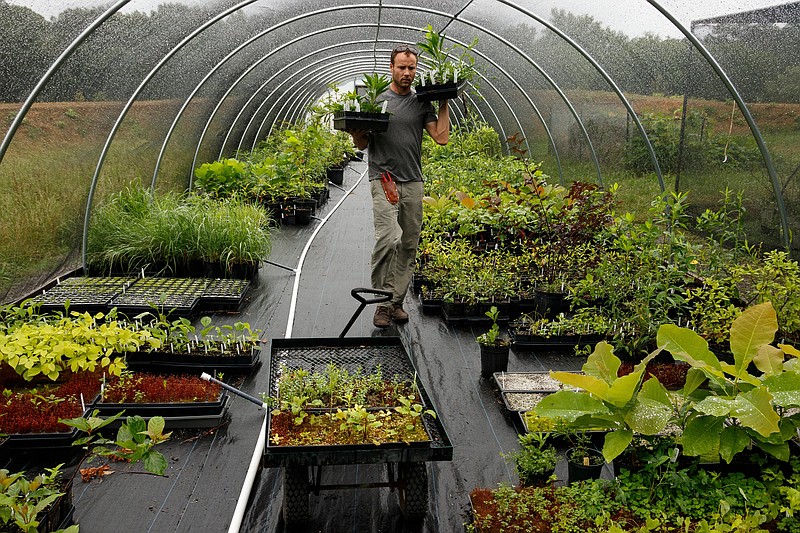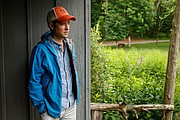Reflection Riding Arboretum and Nature Center is leading a local fight against invasive species through an effort to rid the nature center of privet, honeysuckle and other plants to allow native varieties to grow.
The endeavor started more than a year ago when the center hired a group to clear out about 15 acres where the invasive plants were thickest.
Now, volunteers are helping clear privet from the other 302 acres, and they are being asked to take home and apply the lessons they learned.
"Biodiversity is what we're aiming for," nature center President Mark McKnight said. "We are 317 acres in the middle of a rapidly growing area. It's an area losing biodiversity. There's tangible evidence on the ground of species we are losing. We are committed and fighting for species to have a place where they can thrive."
Nonnative plants were brought to the U.S. for a variety of reasons. Some, such as privet, were brought over purposefully because they grow quickly. Other seedlings have attached themselves to shipments during international trade.
The plants, which aren't necessarily invasive in their home countries, have no natural competition and out-compete other plants for resources.
And it works both ways.
Some plant species that are protected in the U.S. are taken overseas and become invasive.
The plants poach light, water and nutrients from native plants. Privet grows leaves earlier in the year than native species and keeps leaves longer. The leaves create a canopy and block native plants from growing, which is important for the entire ecosystem. The nature center teaches visitors the health of an ecosystem starts in the ground. Plants provide food and shelter for insects, which provide food for birds and other species.
Volunteers - families, office groups, day camps or just individuals looking to help - meet at the nature center property with nature center invasive species specialist Byron Brooks to go into the woods and start clearing the plants. Brooks has been working with groups for several months and still believes there's months of work ahead.
On Wednesday, a group of about 16 kids, ages 11-13, came from a Tennessee Aquarium day camp.
They excitedly grabbed tools and headed off into the woods for a morning of weed pulling. Several in the group used big uprooters, a tool that clamps plants and pulls them out of the ground. Others carried the plants to a growing pile where peers were waiting with pruning shears to break them into smaller pieces. Stacks of privet and honeysuckle - taller than the tallest adult assisting - towered nearby.
"This is surprisingly fun," one girl shouted. "When I thought about it, I didn't think it would be, but it is."
The aquarium day camp meets five days a week. Older kids spend two days each week at the aquarium and three days in the community. Wednesday was a trip to Reflection Riding before swimming at a blue hole. Thursday was ziplining and a stream study on the Ocoee River.
"I thought this would be a good way to give them another angle to conservation and a way to give something back," aquarium educator Betsy Bowden said. "This is a different way for them to learn outside of the water education [they do at the aquarium.] The kids have a blast."
Once the invasive plants have been removed, a group of mainly retirees gathers once a week to work on the next step of the process: taking care of the native plants.
The nature center has a greenhouse and a hoop house containing thousands of plants. The group assembles each Tuesday around a tall, wooden table with a mound of dirt. They mingle and move the plants to bigger pots as they grow. Meanwhile, nature center horticulturists move through the area regularly watering, monitoring and maintaining the plant population.
"There's a lot that goes into it," director of horticulture John Evans said. "We don't just sit around and watch them grow."
McKnight, Brooks and Evans hope their visitors learn while helping. Much of what the nature center does is about education. They want adults to use the lessons in their own yards or kids to go home and talk to their families about using native plants and getting rid of invasive species.
The nature center hosts a native plant sale each spring. It will also host an invasive plant workshop this Saturday from 9 a.m.-12 p.m., costing $35. Registration is available on the Reflection Riding website.
Contact Mark Pace at mpace@timesfreepress.com or 423-757-6659. Follow him on Twitter @themarkpace and on Facebook at ChattanoogaOutdoorsTFP.

